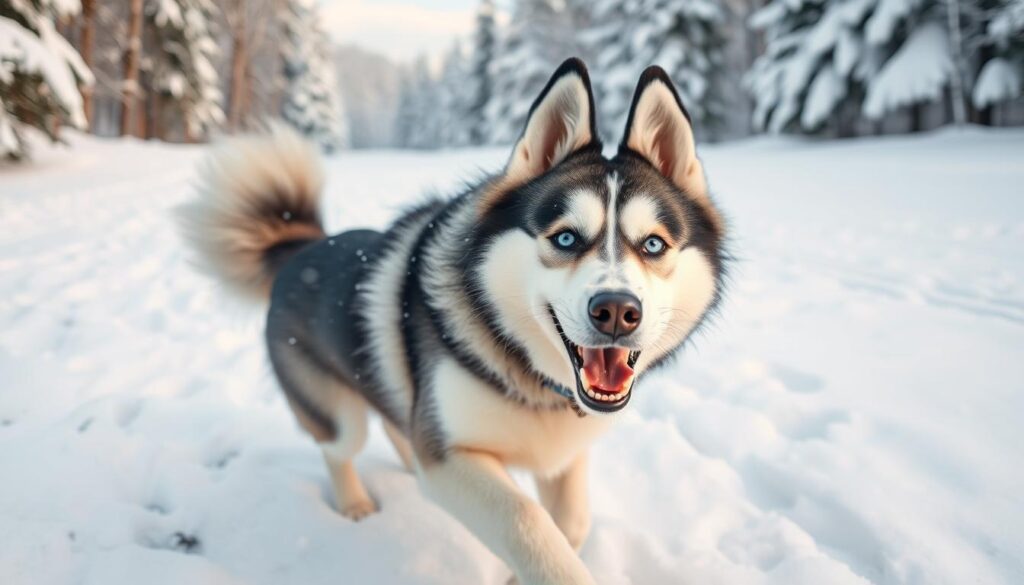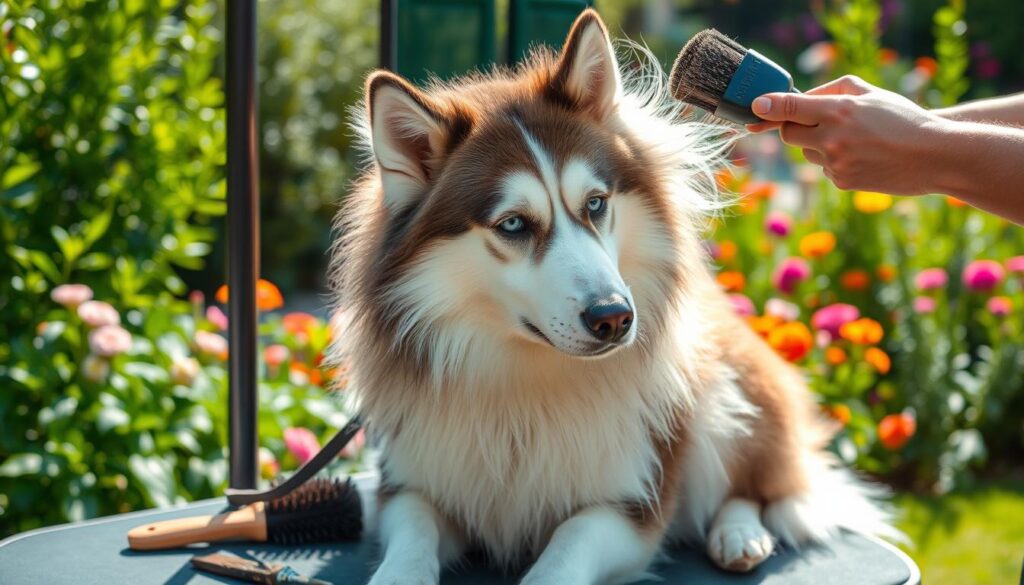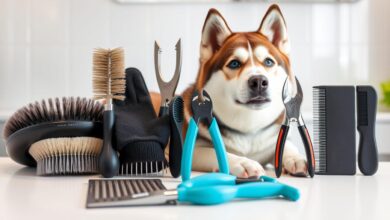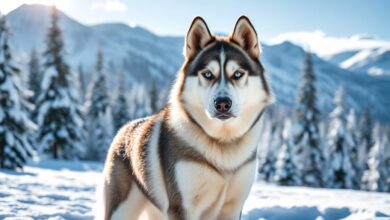Understanding Huskies: Behavior, Feeding, and Care

Siberian Huskies are a captivating breed known for their striking appearance, boundless energy, and loyal personalities. They are highly intelligent and active, needing special attention in their behavior, feeding, and care. This guide will cover the key aspects of understanding and caring for these beloved family companions.
Huskies come from ancient sled dogs bred by the Chukchi people of Siberia. Their thick coats, pointed ears, and wolf-like features show their ancestry. These working dogs were bred to pull sleds and survive the harsh Arctic climate. Knowing their breed characteristics and origins helps provide the right environment and training for them to thrive.
Key Takeaways
- Siberian Huskies are a high-energy, intelligent breed with a distinctive appearance and temperament.
- Huskies were originally bred as sled dogs in the Arctic, requiring extensive exercise and mental stimulation.
- Proper care and training are essential for huskies to channel their boundless energy in a positive way.
- Feeding huskies a nutritious, high-quality diet is crucial to support their active lifestyle.
- Grooming and maintaining the husky’s thick, double coat is an important aspect of their overall care.
The Siberian Husky: A Breed Apart
Siberian huskies have won the hearts of dog lovers everywhere. They come from the icy lands of Siberia. These sled dogs are known for their looks, strong working dog background, and lively spirit.
Ancestry and Breed Characteristics
The Siberian husky’s history goes back to the working dogs of the Chukchi people. These dogs helped pull sleds and carry goods through harsh Siberian landscapes. Over time, they developed into a strong, medium-sized dog with a thick coat and unique facial markings.
These dogs have a sturdy build, erect ears, and a thick double coat. Their coat colors range from white to gray, black, and copper. Their almond-shaped eyes can be blue, brown, or a mix, making them even more appealing.
Working Dog Origins and Temperament
Siberian huskies were bred to be smart, energetic, and adaptable. They are known for being friendly, loyal, and a bit playful. This makes them great pets for families who love to stay active.
These dogs need lots of exercise and mental challenges. Their love to work and please their owners makes them excellent sled dogs and athletes in dog sports.
“Siberian huskies are not just dogs; they are living, breathing works of art, with a spirit that can’t be tamed.”
The Siberian husky’s special breed traits and rich ancestry have made them popular pets and working dogs. Their loyalty, energy, and looks set them apart in the world of dogs.
Husky Behavior: Unlocking the Energetic Spirit
Siberian Huskies are full of energy and life. They need lots of exercise and mental play to be happy at home. It’s important to understand their unique ways to help them be their best.
High Energy and Exercise Needs
Huskies are not lazy dogs. They were made for long work and lots of activity. They need at least 60-90 minutes of hard play every day to be happy.
Socialization and Training Essentials
Teaching huskies to behave and socialize is key. They love to learn and do best with positive training. Early socialization helps them avoid being too shy or aggressive.
Putting time into husky behavior training is essential. It helps them use their high energy and lively temperament in a good way. With the right training, they can be great family pets.

Feeding Your Husky: Nutrition for an Active Breed
Siberian Huskies are high-energy dogs with special nutritional needs. They need a balanced diet to stay healthy and happy.
When it comes to husky feeding, their dietary requirements are key. They do well on a raw feeding diet, which supports their muscles. But, a mix of raw and kibble can also work well.
Huskies need a diet rich in protein and moderate in fat. This helps meet their energy needs. Their food should also have important vitamins and minerals like calcium and phosphorus.
Calorie and Portion Control
Huskies can easily gain weight, so watch their calorie intake. The right caloric requirements depend on their activity level and age. Talk to your vet or a pet nutritionist to find the best feeding schedule and portion sizes.
A well-balanced diet and proper nutrition are vital for your Siberian Husky’s health. By understanding their dietary needs and tailoring their diet, your husky will thrive and live a long, active life.
Grooming and Care for the Double Coat
Keeping a Siberian Husky’s thick, double-layered coat healthy and looking good is key. These dogs need extra care for their shedding, brushing, and coat health. This ensures they stay in top shape.
Shedding and Brushing Requirements
Huskies shed a lot, especially in spring and fall. Their thick undercoat leaves a lot of fur around the house. To handle this, brushing them regularly is a must.
Experts say to brush your Husky 2-3 times per week. This helps get rid of loose hair and stops mats. A good deshedding tool can make brushing easier and more effective.
Bathing and Nail Care
Bathing a Husky should be rare, as their coat cleans itself. Bathe them once every 2-3 months with a mild, pH-balanced shampoo. This keeps their coat healthy.
Don’t forget about their nails. Husky nails grow fast and can be painful if not trimmed. Trim their nails every 4-6 weeks to keep them comfortable and healthy.

“Proper grooming is essential for maintaining the health and appearance of a Siberian Husky’s double coat. Staying on top of their shedding, brushing, bathing, and nail care needs will keep your furry friend looking and feeling their best.”
husky and behavior , feeding and caring
Siberian Huskies are known for their lively personalities and boundless energy. They have a striking appearance that makes them stand out. To keep them happy and healthy, it’s important to know about their behavior, feeding, and care.
Unlocking the Energetic Spirit
Huskies are naturally active and need lots of exercise. They enjoy long walks, hikes, or jogs. This keeps them from getting bored and misbehaving.
They also need training and socialization. Huskies are smart and do well with positive reinforcement. This helps them behave well and stay happy.
Tailoring Nutrition for an Active Breed
Feeding a Husky needs careful thought. They need a diet rich in protein to keep their energy up. A good husky feeding plan includes high-quality kibble or a mix of wet and dry food.
It’s important to control their portions and feed them regularly. This helps prevent them from eating too much and keeps them healthy.
Comprehensive Husky Care
- Grooming: Huskies have a special double coat that needs regular husky grooming. Brushing them often helps manage shedding and keeps their coat shiny.
- Exercise: Huskies need lots of physical and mental husky exercise. Activities like hiking, swimming, and playtime are essential for their happiness.
- Veterinary Care: Regular vet visits, vaccinations, and watching out for health issues like hip dysplasia are crucial. This ensures they stay healthy and happy for a long time.
Understanding Huskies’ unique needs helps owners create a fulfilling relationship with them. This includes knowing about their behavior, feeding, and care.
Environmental Enrichment for Mental Stimulation
Huskies are smart and love to stay active. They need mental challenges to avoid boredom and bad behavior. You can keep their minds sharp with fun toys and puzzle feeders. These activities satisfy their curiosity and love for exercise and activity.
Toys and Puzzle Feeders
Get a range of toys that make your Husky think and explore. Puzzle feeders are great because they make your dog work for their food. This keeps their mind active and encourages natural hunting behaviors. Chew toys, snuffle mats, and treat dispensers also offer lots of fun and learning.
Change your Husky’s toys often to keep them interested. Play games that challenge their mind, like hide-and-seek or following scents. This way, you meet their activity and exercise needs, helping them stay happy and healthy.
“A bored Husky is a destructive Husky. Providing ample environmental enrichment and mental stimulation is key to keeping your pup happy and well-adjusted.”
Caring for a Husky Puppy
Raising a Husky puppy is an exciting journey. It needs a proactive approach to socialization, training, and nutrition. Introduce your Husky pup to new experiences, teach them good habits, and feed them right. This will help them succeed in life.
Socialization and Training from an Early Age
Husky puppies are smart and full of energy. They need socialization and training from the start. Introduce them to different people, animals, and places to help them grow confident.
Use positive reinforcement to teach them good behaviors. This is key for managing their energy. It helps them learn obedience and control.
Nutritional Needs During Growth Stages
Huskies go through different growth stages, each needing special nutrition. Feed them a high-quality diet that matches their age. This ensures they get the nutrients they need for growth.
Work with your vet to find the right mix of protein, fats, and carbs. This will help your Husky grow strong and healthy.
| Growth Stage | Recommended Nutrients |
|---|---|
| Weaning to 4 months | High-protein, calorie-dense puppy formula |
| 4 to 12 months | Moderate-protein, balanced puppy or all-life-stages formula |
| 12 months and beyond | Moderate-protein, balanced adult dog formula |
By focusing on socialization, training, and nutrition, you can raise a well-adjusted, healthy, and happy Husky puppy.
“Raising a Husky puppy is a rewarding experience, but it requires dedication and a deep understanding of their unique needs. With the right approach, you can help your pup thrive and become a loyal, lifelong friend.”
Health Concerns and Senior Care
As your Siberian Husky ages, knowing about common health issues is key. Huskies can face hip and elbow dysplasia, eye problems, and thyroid disorders. Regular vet visits and preventive care are vital for their health and happiness.
As Huskies get older, their diet and exercise needs change. Special senior dog food and a customized activity plan are important. Also, watch for arthritis or cognitive decline and get the right treatment. This dedicated care helps aging Huskies live better lives.
Understanding breed-specific health issues and senior Husky needs is crucial. Regular vet visits, tailored nutrition, and a focus on comfort and enrichment are essential. These steps help Huskies enjoy their golden years to the fullest.


